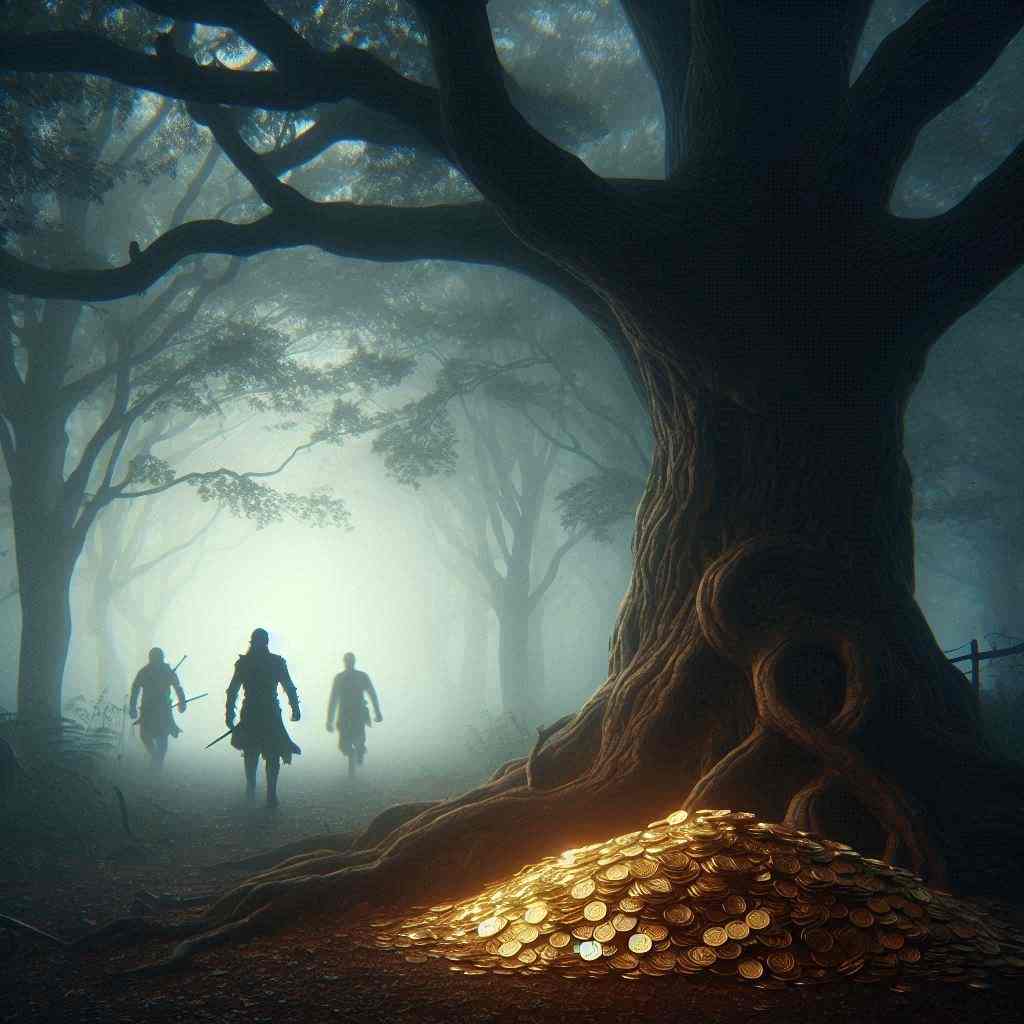The Pardoner's Tale
Richard

In a village far and wide,
Three young men of sinful pride,
To the tavern they did ride,
With gold and ale their hearts confide.
"Death, oh Death, where dost thou hide?
We seek thee out, we shall not bide.
With a curse and a pledge, by dawn's early tide,
We’ll conquer thee, we’ll turn the tide."
An old man they did espy,
Wrinkled face, and hollow eye,
“Why do you live when all must die?”
Said he, “Find Death where shadows lie.”
To an ancient oak they roam,
Found a treasure, bright as foam,
Gold so bright it shone like dome,
“We are rich!” they cried, “This wealth we own.”
One went off to fetch their bread,
Greed and envy filled their head,
Two conspired when he returned,
His life they'd take, their hearts had turned.
The one returned with poisoned wine,
Plans to claim all gold as mine,
The two did strike, their friend lay dead,
Then drank the wine, by poison led.
They drank and died, the gold untouched,
In greed’s cruel grasp, their fate was clutched,
For Death had come, by greed dispatched,
Their souls to Hell, forever snatched.
So heed this tale of folly's cost,
Greed and pride, all lives are lost,
In shadows deep where souls are tossed,
The wages of sin are cold and frost.
Richard's The Pardoner's Tale
"The Pardoner's Tale" is a powerful ballad that weaves together themes of greed, pride, and the inevitability of death, drawing inspiration from Chaucer's classic morality tale. The song's structure, with its repeated refrain, creates a haunting rhythm that echoes the relentless pursuit of death by the three young men.
The opening stanza sets the scene, introducing the protagonists as "three young men of sinful pride." Their hubris is immediately apparent as they boldly declare their intention to conquer death itself. This arrogance is reinforced by the recurring refrain, "Death, oh Death, where dost thou hide? We seek thee out, we shall not bide." The irony of their quest becomes increasingly apparent as the tale unfolds, with each repetition of the refrain serving as a grim reminder of their foolish bravado.
The introduction of the old man adds a layer of mystery and foreboding to the narrative. His cryptic advice to "Find Death where shadows lie" serves as both a warning and a prophecy, foreshadowing the tragic events to come. The contrast between the young men's vitality and the old man's frailty underscores the transient nature of life and the universality of death.
As the story progresses, the discovery of the treasure becomes the catalyst for the young men's downfall. The gold, described as "bright as foam" and shining "like dome," represents the allure of worldly riches and the corrupting influence of greed. The imagery of the "ancient oak" where the gold is found suggests a connection between the treasure and something primordial and perhaps forbidden.
The subsequent betrayal and murder plot reveal the depths of human depravity when faced with the prospect of wealth. The line "Greed and envy filled their head" succinctly captures the moral decay that leads to their ultimate destruction. The poisoned wine becomes a potent symbol of treachery, while also serving as an ironic instrument of justice.
The final stanzas of the song deliver a powerful moral lesson. The image of the gold lying "untouched" amid the bodies of the three men serves as a stark reminder of the futility of greed in the face of death. The line "For Death had come, by greed dispatched" effectively conveys the idea that their own avarice became the agent of their demise.
The song concludes with a somber warning to the listener, urging them to "heed this tale of folly's cost." The vivid imagery of souls tossed in "shadows deep" and the "wages of sin" being "cold and frost" create a chilling picture of the consequences of unchecked greed and pride.
Throughout the ballad, death is personified as an entity to be sought and challenged, adding depth to the theme of mortality. This personification culminates in the final refrain, where the young men, now presumably speaking from beyond the grave, acknowledge their folly in seeking death and succumbing to their own pride.
"The Pardoner's Tale" serves as a timeless reminder of the dangers of greed, the futility of challenging death, and the importance of humility in the face of our own mortality. Its haunting refrain and vivid imagery leave a lasting impression, inviting listeners to reflect on their own values and the true meaning of wealth in a world where death is the great equalizer.
This text was generated by AI and is for reference only. Learn more
Want to join the discussion? Reopen or create a unique username to comment. No personal details required!



Comments
No comments yet. Be the first to comment!